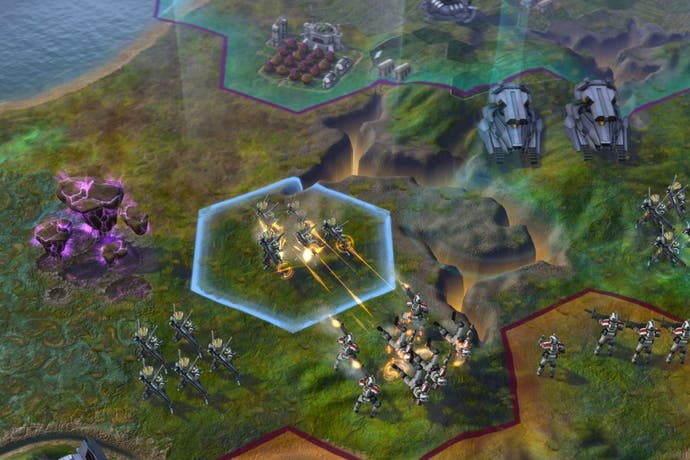How Firaxis is building its Civilization: Beyond Earth
Escape from Alpha Centauri.
Everything went wrong when six Siege Worms suddenly appeared out of the ground. Think Dune's sandworms, only without their water allergy weakness, as comfortable in the grasslands of humanity's new home as its deserts, canyons and the less familiar fungal blooms. Attempts to keep very, very quiet or point to the nearest enemy city didn't go so well, as one giant's tendrils whipped every soldier in the area into human paste, before turning its attention inwards.
Conquering the world is much harder when the world itself fights back.
For Firaxis, however, there's a much bigger challenge than simply ushering humanity into a technologically advanced future, and that's doing it in the shadow of Alpha Centauri, one of the most beloved 4X games save for Civilization itself. The bad news is that Beyond Earth isn't, in any real sense, Alpha Centauri 2. The good news is that it's not constrained by having to try to be , able to both cherry-pick from its legacy and craft a whole new path for humanity.
"We draw a lot of homage from Alpha Centauri, a lot of inspiration," co-designers Will Miller and David McDonough freely admit. "But in terms of vision, this is a very different game. Alpha's contemporary was Civ 2, and I think it was an excellent companion to that. When we set out to make Beyond Earth, we said it was going to be a companion to the whole Civ legacy."
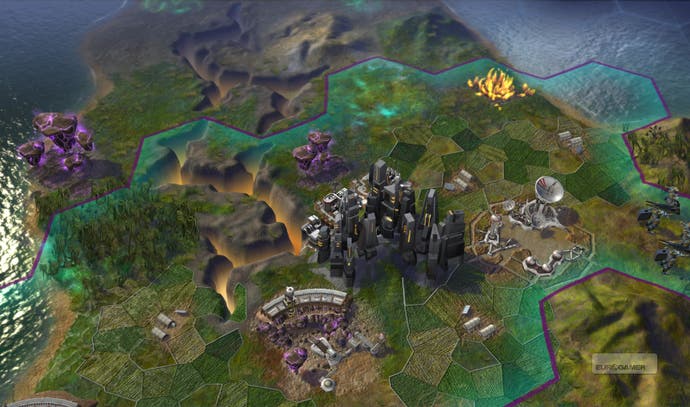
That lineage is immediately obvious. Initially, and intentionally, Beyond Earth looks very much like Civ 5 in space - a familiar experience intended to ground what follows. But it's far from simply a new skin for the hexes with the word 'space' in front of the technologies - even the familiar getting a few tweaks. The Policies screen is now Virtues, society-wide upgrades with rewards for going both wide and deep into the trees. There's an orbital tactical layer that allows for advantages like giving units underneath powerful bonuses - even in enemy territory - as well as shooting dead anyone who asks how the hell you can have fog of war on a planet you came to from space. (Was nobody looking out of a window?)
Most notably, the research tree is now a research web, allowing far more flexibility in terms of advancement. Each branch, like Nanotechnology, requires huge research investment, but once unlocked allows for cheaper projects to put what your scientists have learned into practice - Ecology, for instance, helping clear the gaseous Miasma that blights the landscape and damages units caught in it, while Nanotechnology allows for boosts to both production and some powerful new weapons. No society will be able to invent everything in a single playthrough, in the first of many ways that Beyond Earth wants to keep its Civs distinct.
As for Alpha Centauri, one of the biggest shifts is tone. It was an astoundingly dark, pessimistic game which began with the colonisation crew of a ship called "Unity" fragmenting into warring factions and going downhill from there. Beyond Earth is at least a little more upbeat, both in plot and mechanics. You're regularly asked to make decisions, like whether to plough surplus resources into production or food. Another choice might see you choosing whether to grant a station charter to "a revolutionary vertically integrated laboratory" or one not clearly run by raving marketing arseholes and thus able to promise straight-up biomechanics expertise. Decisions are always built around choosing bonuses and advantages though, not taking penalties and sacrifices.
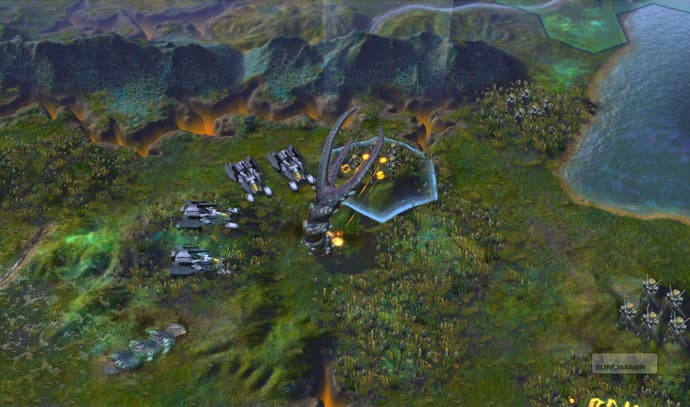
"True Civ games always have an optimistic bent," confirms Miller. "We talk about things like the Great Mistake, but it's always couched in terms of how we overcame that to launch human beings into space. We want this game to plausibly illustrate how we would evolve our species in a way that lets us adapt to a new world and move on. The different Affinities [you work towards] are all post-humanist trajectories that are aspirational in their own way."
Affinities are arguably Beyond Earth's biggest gamble, and its strangest individual element - the initially AWOL religious side of Civ suddenly showing up with a rocket launcher and declaring itself King of the Game. All civilisations will ultimately fall into one of three camps - Harmony, Purity or Supremacy - which feel a lot like space cults, right down to faction leaders slowly accruing robes and similar to declare their allegiance as the turns tick on. "You're not wrong to read a religious tone," admits McDonough. "Really, the Affinities are a whole cultural philosophy, spider-webbed through everything you do from science to diplomacy."
As part of this, you don't simply pick one. Instead, you accumulate points based on the technologies you research, demonstrating your focus in the most practical way. Harmony players are all about working with the planet, their goal being to merge with it. Supremacy players are those who've invested in advanced technology, their end goal being to open a portal to Earth and bring it into line too. Finally, Purity players are the guys in the "NO, YOU CHANGE" T-Shirts (or at least could be, with the right mod), devoted to hanging onto humanity and bringing the new world into line until refugees can be brought along to it. Other known endings include Contact, inspired by the Carl Sagan novel about the discovery of other sentient life in the universe, and the classic Civilization standby "Kill 'em all!"
The three paths aren't as limiting as they initially sound though, both because you earn points in them all rather than simply picking one, and the fact that they're not linked to play styles. A Harmony player is just as capable of throwing down as a Supremacy one, perhaps by creating powerful alien hybrids, or simply using the Miasma as a tactical advantage. Points towards each affinity are also spent on unit upgrades, each with their own options - a Supremacy Marine for instance always benefiting from backup on the field, but either kicking back with bonus healing, or getting a 50 per cent bonus while flanking. "You're inevitably some combination of all the Affinities, with whatever the greatest one is defining your morphology," explains Miller. "But my Harmony build may look much different from yours, even if our leaders look similar."
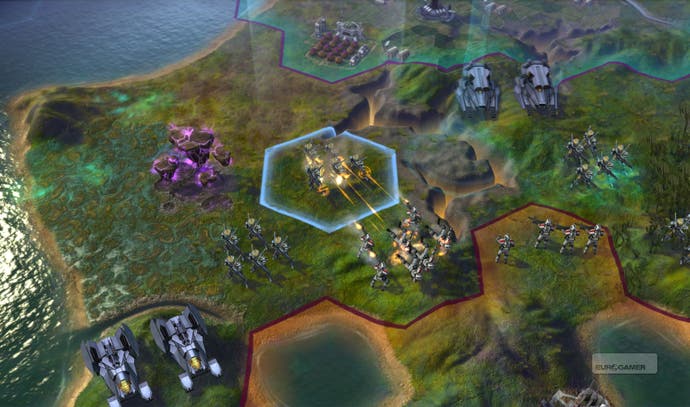
Competing factions will also have to choose their path through each game based on needs, location and other factors, rather than following the strict patterns of Alpha's ideologies. "We have eight playable factions and we wanted them to be as distinctive as those in Alpha Centauri," says Miller. "Over and over, we hear people saying that they felt that gave the game real opponents and interesting people. At the same time, we didn't want them to feel contrived, where they'd always behave the same way. You still have the 'truculent' civ and the 'economic' civ and so on, but we want them to be puzzles that you'll have to work out each time."
Sadly, it wasn't possible to see if the new characters would have the same kind of hook, both because they arrive on the planet later than the player does, and because those who landed were still using placeholder dialogue - no snide jibes about the new Lady Deidre dancing naked through the trees or impromptu songs about her 'network node' yet. As in Alpha Centauri though, the planet is also a faction in its own right. Alien species are always active, but not necessarily actively aggressive. Nests near cities are a problem, as they keep churning out alien units like infantry Wolf Beetles until you send a soldier over to stomp them. But aliens won't necessarily attack unprovoked - an icon over their head shows their current hostility. With the right technology, they can also be weaponised - for instance, a spy sneaking a Dune-style thumper into a city to draw those pesky Siege Worms down on its head.
To start with though, expect more familiar toys. Alpha Centauri had definite fantastical elements and the Harmony goal pays a fairly blatant tribute to one of them, although ultimately rooted in science-fiction. The Firaxis of 2014 has similar goal; keeping Beyond Earth's take on the future at least plausible and familiar, both for the sake of immersion and the continued approachability of the game as a strategy experience.
"Getting the vocabulary of science-fiction into gameplay is an ongoing, fascinating, but challenging problem," explains McDonough. "It was important the game starts with recognisable, conventional science, and then take small believable steps until by the end of the game with the wild and imaginary science-fiction stuff, you can look back and see the progression. That's everything from the units, the Wonders, following that thread of plausibility. We're very concerned with making sure it's grounded science, how we realistically understand our possibilities landing on a new planet and [that it] makes sense to everyone. Then we take it gradually into more elaborate SF stuff, just because it's fun."
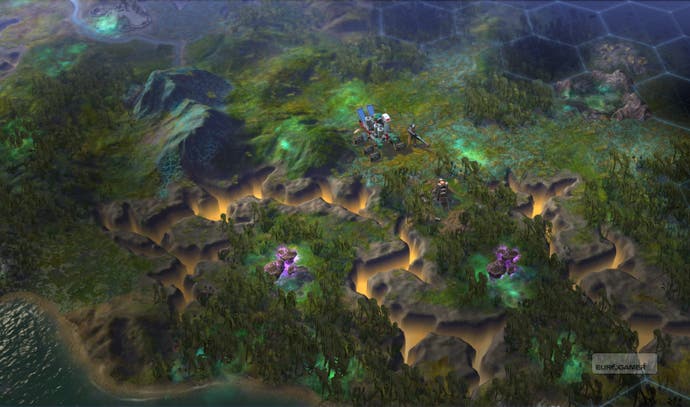
For the sake of the game though, this unsurprisingly means a lack of instant doomsday weapons like grey goo, and cities remaining visibly cities rather than factions casually uploading themselves into nanite swarms and writing abusive messages in the stars. To be a Civ game, even a future tank is always fundamentally going to be a tank underneath all the chrome. The team's attempted fix is to do to units what the main game does to the societies - key choices, big impacts. "One of the interesting things we've done with military units is to categorise them and their upgrade progress by their combat role, and then make units that fit those roles and options for the player to modify and blend," says McDonough. "A tank for instance, it's armoured and it's fast. But as you fight battles, you may discover you want more of one of those and can change your own definition of what a tank is."
There won't be full-on Alpha Centauri-style unit creation though. "If it got really granular then you could put all the pieces together to make a unit, but it became tedious. When it was a balance of that, mirroring the decisions made in the tech tree and picking upgrades that were a little more constrained, the choices became a little easier and more gratifying."
Having played Beyond Earth for about 50 turns, I can confidently state that 50 turns is nowhere near enough to get a true feel for its changes and its subtleties. It is, however, plenty to get extremely excited by the possibilities and be remorselessly crushed by Siege Worms. Alpha Centauri isn't simply my favourite Civ game, but my favourite 4X strategy game of all time, period, but it still didn't take long to realise that staring at Beyond Earth through that lens - rose-tinted or not - wasn't really in either game's favour. It's a much sleeker, more streamlined game that lacks a little frontier roughness. It's not quite as alien (at least, not on the tileset I played on) and has a far stronger focus on further developing a society that's passed the test of time and is ready to move on to its A-Levels. That element of designing on the fly is extremely exciting, both from a fictional and a mechanical angle, provided the Affinities don't lock things down too much and allow for the flexibility that has been promised.
As for the future, unsurprisingly Firaxis is taking a 'could we get the first game out, please?' stance. Should Beyond Earth go well though, the sequel potential is obvious - but not just in the obvious way. While the easy sequel would be to step up the scale to multiple planets and councils of alien races (particularly given the Contact ending), it could well be that we'll be replaying this crucial stage of future history for a good long time to come, even ignoring the modding possibilities that will be available to players at launch, and any expansion packs.
"Civilization has been remade and iterated on over and over again," Miller points out. "And we've designed this game to lay a foundation for that kind of progression. This is a really intriguing story to tell, where we colonise a new world, master it, become the next evolution of humanity... and I think there's a lot of space in that."
This article was based on a press trip to LA. 2K paid for travel and accommodation.
